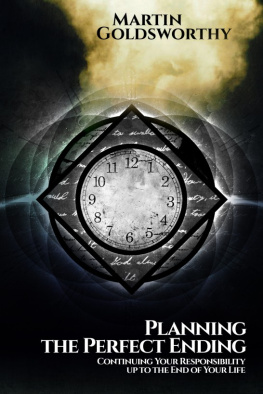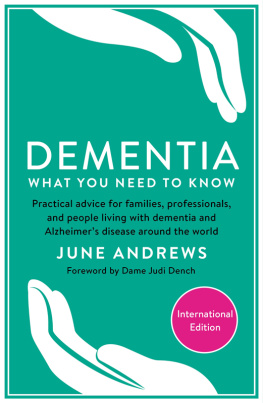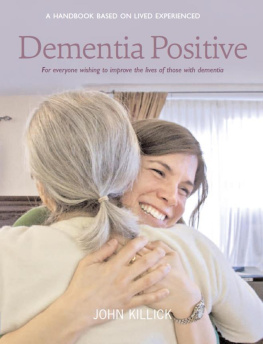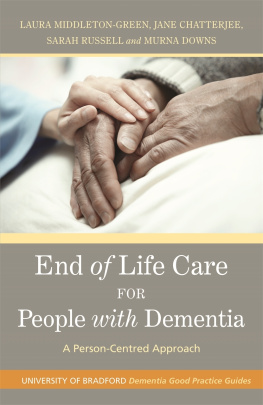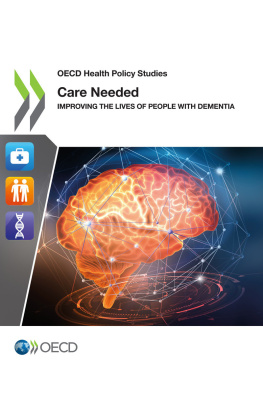Planning thePerfect Ending Continuing Your Responsibility up to the End ofYour Life
By MartinGoldsworthy
Copyright 2016 MartinGoldsworthy
Smashwords Edition
This ebook islicensed for your personal enjoyment only. This ebook may not bere-sold or given away to other people. If you would like to sharethis book with another person, please purchase an additional copyfor each recipient. If you are reading this book and did notpurchase it, or it was not purchased for your use only, then pleasereturn to your favorite ebook retailer and purchase your own copy.Thank you for respecting the hard work of this author.
Contents
Preface - 2nd Edition
This wasoriginally written for me and for my family. Early in 2015 one ofmy weekly blog posts (1) had the title Still who? It concernedwhat I call end-of-life options. Shortly afterwards I had theopportunity to discuss the post with my daughters; face to face.The fact that they live in Europe and I live with my partner inPer can make things more complicated, but it also makes it evenmore important to define my wishes clearly for all concerned. Mypartner, who is Peruvian, had insisted even earlier that I shouldwrite some things down. What she had in mind was avoiding anydifferences with my daughters about what to do with the body aftermy death. For me, of course, that is the simplest part.
The end of mylife was not something that my daughters, or my partner, would havechosen to think about. Finally, I agreed with my daughters that itwas up to me to define things, to make my plan for the end of mylife. They said that with that in hand we could then have a moreconcrete discussion, but they may have just been trying to put itoff.
As I started todevelop my plan it soon became evident that it is not so simple. Ithad been clear to me for many years that there is a particularproblem in defining the criteria for taking action. When is enoughof life enough? When is the likely future quality of life going tobe inadequate? The way to take action to end your own life, or toensure somehow that the appropriate action is taken, is also anaspect of the problem with many complications. What happens if youare incapable of acting yourself? My approach to overcoming thiscollection of difficulties was to make a kind of guide for me, asthe first step, and this became the book.
As I waswriting this in 2015, and then updating it in 2016, there wassignificant discussion in several countries (see e.g. (2)) aboutallowing more assistance with ending life in the case of terminalillness, or of severe physical disability. Mental problems, and inparticular senile dementia, were scarcely being discussed in thiscontext, at least not openly. I hope that this will change. When itdoes, it will need to be taken into account in our own plans.
My hope is thatothers will find this book useful as they decide to continue theirresponsibility for their own life right up to the final curtain,and perhaps even a bit beyond. My current plan for the end of mylife is included here as an example in the Appendix. If you wouldlike to use an editable version of the Appendix to set out your ownplan, send me a request at .
1 Introduction
Is myexperience atypical? Some people think that this interest indeciding now about the end of my life is macabre. They might saysomething like Concentrate on living your life but death is theonly inevitable part of it.
Maybe itstarted for me in the early 1970s. I heard hospital doctors talkingabout managing pain for terminally ill patients. They spoke ofdoubling the dose of diamorphine every day, shortening a little theultimate stage. Then my daughters great-grandmother celebrated her100th birthday and cleverly managed to die peacefully just a shortwhile later, in the night after her sister left to return toCanada. I probably saw Phillip Larkins poem The old fools aroundthe same time. These were all distinctly different impressions ofthe end of life.
Later, closerto home, I saw my father dying he said he was not ready to die.In contrast, for a long time before she died, my mother consideredherself useless and a burden.
Most recentlyit was a film, Still Alice, which started me thinking about thecontrasting end-of-life situations for people with physical illnessand debility, and for those with dementia.
With this bookI want to help you to define and to decide about your death, to theextent that anyone can. We also need to help our near ones. As weapproach our death, they may have to decide or even act for us, andthen they will need to know what we would want. Defining in advancewhat you want, or dont want, is the best way to ensure that youdie with dignity. It wont avoid any of your near ones grief, butit may spare them some agonizing decisions.
If thisthinking about the unthinkable is done properly, it should enablemost of us to make appropriate preparations and to say our goodbyesproperly. Very few of us die in accidents. With foresight andplanning many more of us could have something like what we considerto be the perfect end to our life.
It is fair tosay that we, those reading this, are lucky to have some end-of-lifechoices. For many people, especially in poor parts of the world,this is not a luxury they need to worry about. Wars and diseaseshave also eliminated the opportunities for a calm and dignifieddeath for many in the past, and, unfortunately, will continue to doso in the foreseeable future. Even for us, some kind of disastermay yet interfere with our long-term planning.
Medical scienceand technology is making progress in many areas. By the time youare approaching the end of your life the situation may be verydifferent from how it is today. Laws about assisting someone to dieearly may also be relevant. These too may change. It is thereforeimportant to keep your eyes and ears open, and to talk to yourfriends and relatives about what is going on around you. That mightjust make life interesting enough for you to want to continueliving for a while longer, and, at some stage, it may change howyou think about how the end of your life should be.
2 Why think about it?
Would you liketo have a perfect end to your life? How about the one describedbelow?
Imagine thatyou are still mainly well, but you often have aches and pains. Yourpartner has already died. You cant see, hear, taste, move etc. asyou used to. You still live in your home but with every year whichpasses your life is becoming poorer in experiences, and morerestricted. You have made appropriate provisions for when you havegone. You have said your goodbyes to people and places you love,and then one day, shortly thereafter, you just dont wake up.
In todaysworld there are too few lives which come to a perfect end.
We are allmortal. If we have not prepared properly, and we are unlucky, wemay leave our close relatives with difficult decisions about how tomanage the end of our life. You have probably already experiencedthis kind of anguish at close quarters. Perhaps you have had todecide for someone you loved, without being sure what they wouldwant for themselves. Do you want to leave your loved-ones with thatto bear?
If you havenobody who will feel personally responsible for you, then you willultimately be at the mercy of the standard responses of the medicalsystem. In that case it may be even more important to define inwriting what you want, or dont want.
Not to beforgotten in this is that none of us wants to die sooner thannecessary. The understandable tendency is to try to preserve life,to try another treatment. But such an approach can increase thechance that we will finally be in a condition, or in a place, whichprevents us having the perfect ending which we would havechosen.

